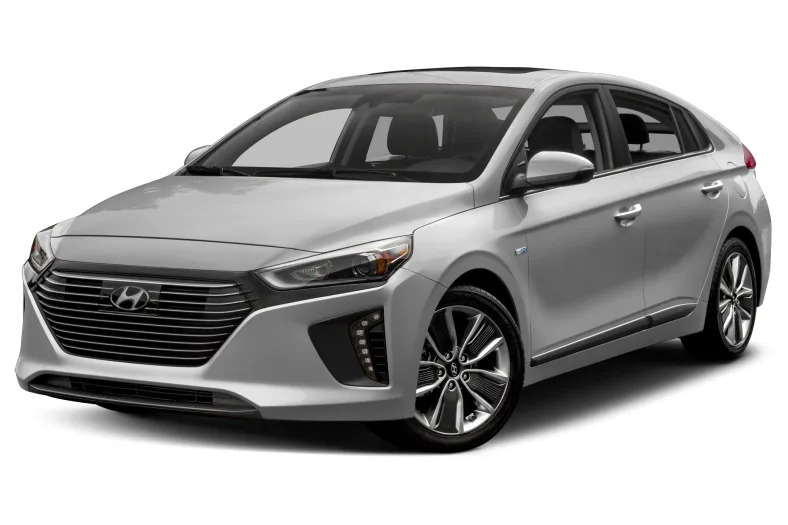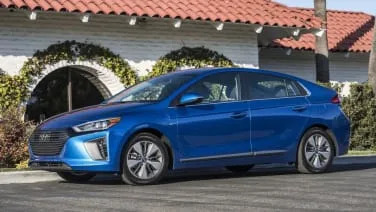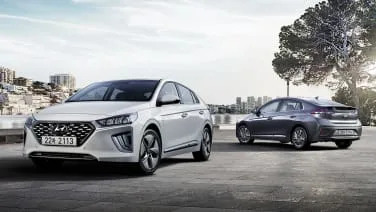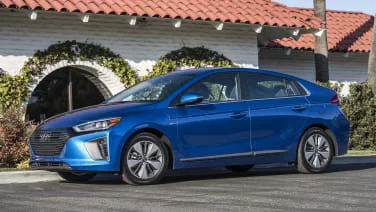2017 Hyundai Ioniq Hybrid
Industry
The Ioniq is Hyundai's "golden medal project," conceived from the outset as a car to beat the Toyota Prius and be the most efficient on the market. Ki-Sang Lee, Hyundai's senior vice president in charge of eco R&D, promised that if they could accomplish that feat, he'd give every single engineer on the project a gold medal. The result of their work is an attractive trio – hybrid, plug-in hybrid, and electric – built on the company's first dedicated green vehicle platform. And Lee gave out more than 500 gold medals to his engineers. With a growing number of drivers – bolstered by Millenials replacing the buying power of baby boomers – who value efficiency and consider the environmental impact of their purchases, hybrids and electric cars should be a popular choice, right? While cheap gas has not helped to encourage people to make the switch to greener vehicles in the last couple years, the added cost and complexity of electrified cars have also been barriers to wider adoption. Hyundai's approach appears solid. The Ioniq hybrids are straightforward, affordable, and something drivers would be proud to own without appearing smug. So Hyundai has built the car people claim to want, but will the drivers show up at dealerships? The Ioniq is attractive for a number of reasons, not the least of which is pricing. The Ioniq Hybrid starts at $23,035, undercutting the Toyota Prius by $2,535 (with its base MSRP of $25,570). It's also more efficient, with EPA mpg figures of 57 city/59 highway/58 combined. The most efficient Prius (the Two Eco trim level) falls slightly short at 58 city/53 highway/56 combined. While the Ioniq Plug-In Hybrid doesn't have price or fuel economy figures yet – it doesn't go on sale until the fourth quarter of 2017 – we do know its 8.9-kW battery pack offers over 27 miles of all-electric range and can be topped off in 2.5 hours on a Level 2 charger. The Ioniq's green cred doesn't stop at its efficient powertrain. Sitting inside the cabin, you wouldn't realize that the soft plastics contain 25 percent sugar cane, or that the headliner and carpet contain about 20 percent of the same renewable plant material. There's no way to tell by look or feel that door trim uses recycled plastics mixed with wood powder and volcanic stone, making it 20 percent lighter. Interior metallic paints use soybean oil to lessen their environmental impact. Even better, it all agrees with the senses. The interior comes together nicely, and doesn't sacrifice a sense of quality or comfort for the sake of eco responsibility or, for that matter, value. These materials would be right at home in the cockpit of a car a class or two up. From behind the wheel, the Ioniq Hybrid and Plug-In Hybrid are nearly identical in their driving experience, with the PHEV feeling much more akin to its plugless twin than to the all-electric model. They share the same 1.6-liter four-cylinder gasoline engine (with an impressive …
Full Review
The Ioniq is Hyundai's "golden medal project," conceived from the outset as a car to beat the Toyota Prius and be the most efficient on the market. Ki-Sang Lee, Hyundai's senior vice president in charge of eco R&D, promised that if they could accomplish that feat, he'd give every single engineer on the project a gold medal. The result of their work is an attractive trio – hybrid, plug-in hybrid, and electric – built on the company's first dedicated green vehicle platform. And Lee gave out more than 500 gold medals to his engineers. With a growing number of drivers – bolstered by Millenials replacing the buying power of baby boomers – who value efficiency and consider the environmental impact of their purchases, hybrids and electric cars should be a popular choice, right? While cheap gas has not helped to encourage people to make the switch to greener vehicles in the last couple years, the added cost and complexity of electrified cars have also been barriers to wider adoption. Hyundai's approach appears solid. The Ioniq hybrids are straightforward, affordable, and something drivers would be proud to own without appearing smug. So Hyundai has built the car people claim to want, but will the drivers show up at dealerships? The Ioniq is attractive for a number of reasons, not the least of which is pricing. The Ioniq Hybrid starts at $23,035, undercutting the Toyota Prius by $2,535 (with its base MSRP of $25,570). It's also more efficient, with EPA mpg figures of 57 city/59 highway/58 combined. The most efficient Prius (the Two Eco trim level) falls slightly short at 58 city/53 highway/56 combined. While the Ioniq Plug-In Hybrid doesn't have price or fuel economy figures yet – it doesn't go on sale until the fourth quarter of 2017 – we do know its 8.9-kW battery pack offers over 27 miles of all-electric range and can be topped off in 2.5 hours on a Level 2 charger. The Ioniq's green cred doesn't stop at its efficient powertrain. Sitting inside the cabin, you wouldn't realize that the soft plastics contain 25 percent sugar cane, or that the headliner and carpet contain about 20 percent of the same renewable plant material. There's no way to tell by look or feel that door trim uses recycled plastics mixed with wood powder and volcanic stone, making it 20 percent lighter. Interior metallic paints use soybean oil to lessen their environmental impact. Even better, it all agrees with the senses. The interior comes together nicely, and doesn't sacrifice a sense of quality or comfort for the sake of eco responsibility or, for that matter, value. These materials would be right at home in the cockpit of a car a class or two up. From behind the wheel, the Ioniq Hybrid and Plug-In Hybrid are nearly identical in their driving experience, with the PHEV feeling much more akin to its plugless twin than to the all-electric model. They share the same 1.6-liter four-cylinder gasoline engine (with an impressive …
Hide Full Review
Hide Full Review
Retail Price
$22,200 - $27,500
MSRP / Window Sticker Price
| Engine | I-4 |
| MPG | Up to 57 city / 59 highway |
| Seating | 5 Passengers |
| Transmission | 6-spd auto-shift man w/OD |
| Power | 104 @ 5700 rpm |
| Drivetrain | front-wheel |
Smart Buy Program is powered by 





